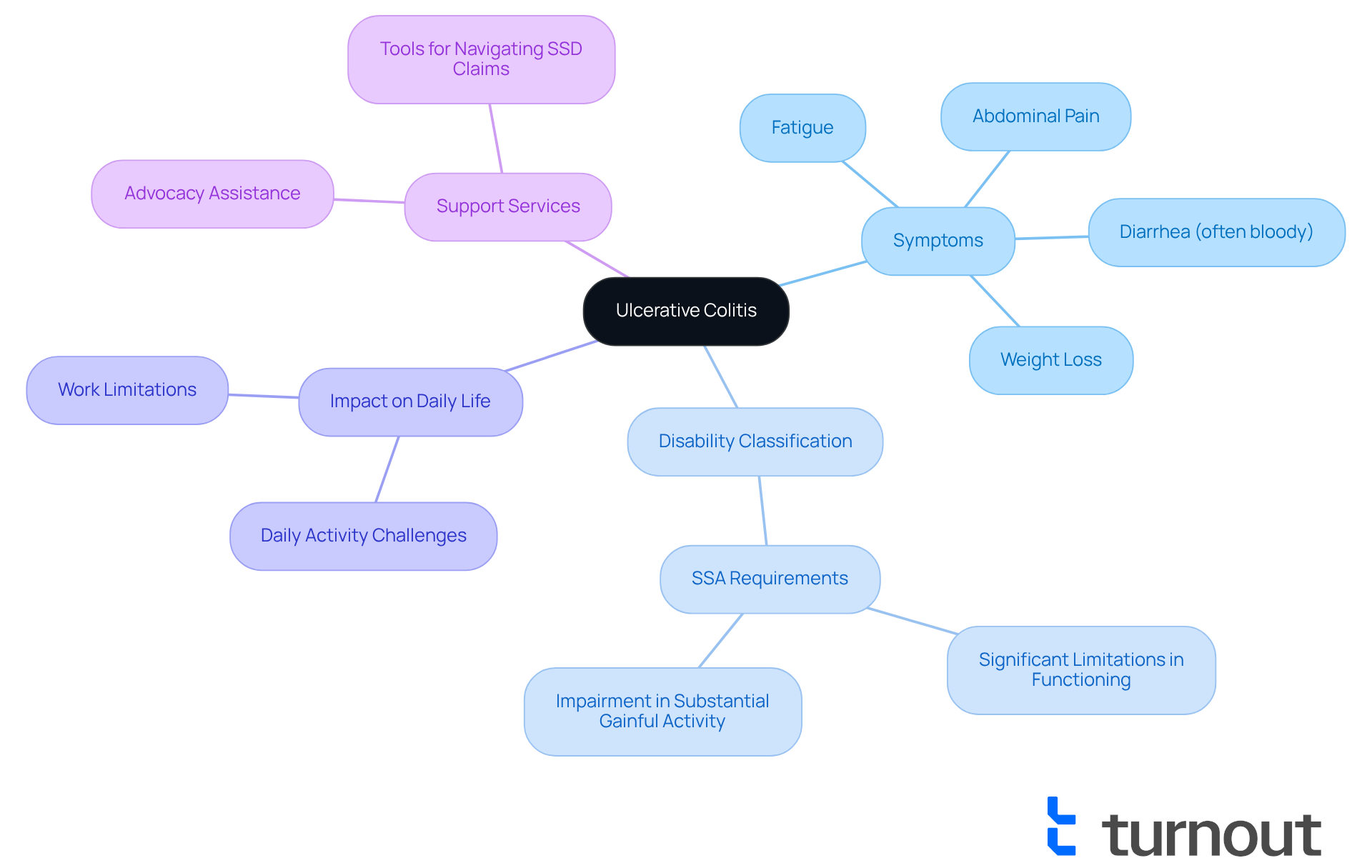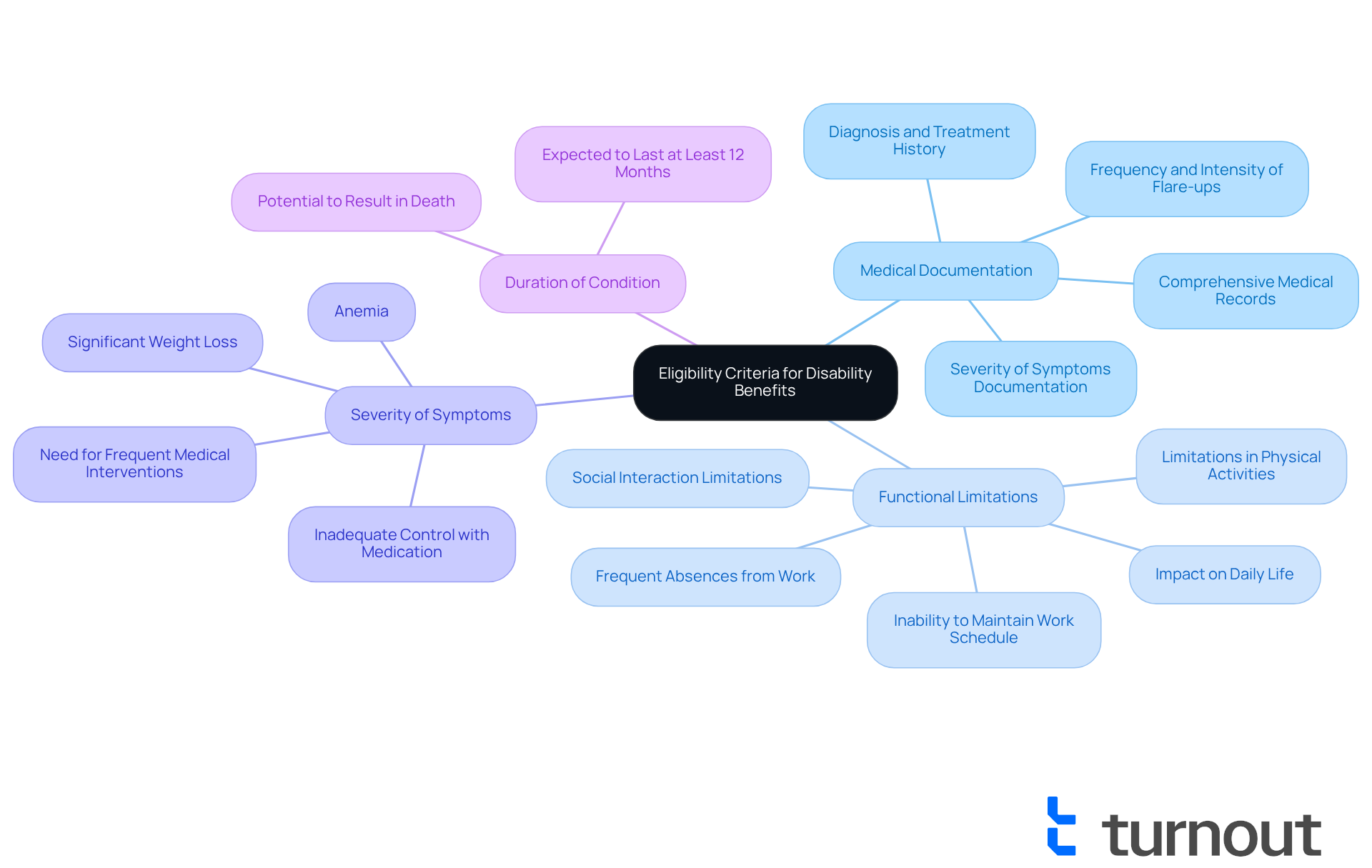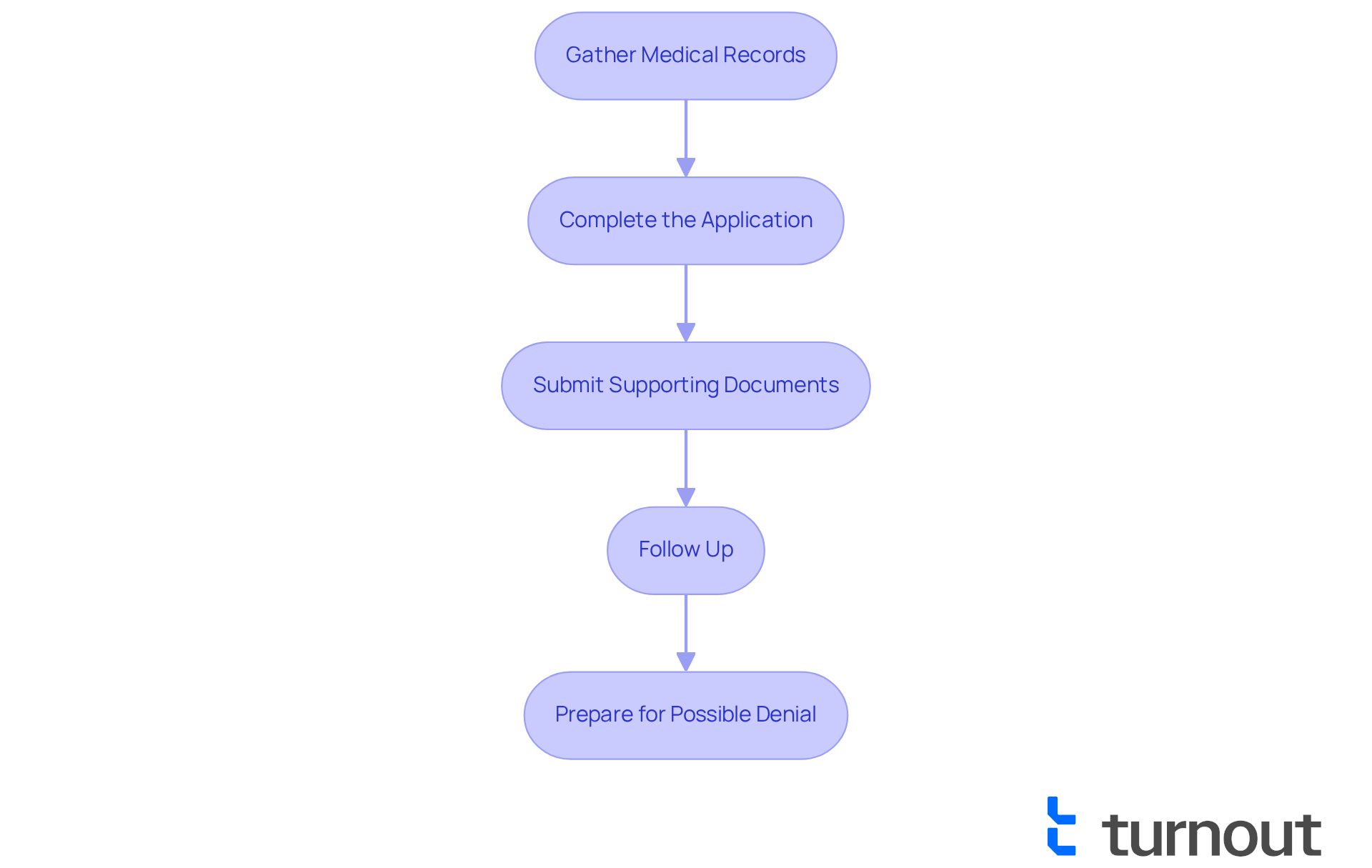Overview
Navigating the disability application process for ulcerative colitis can feel overwhelming. We understand that the journey is filled with challenges, and it’s essential to know that you are not alone in this. This article offers a comprehensive step-by-step guide designed to support you every step of the way.
Understanding the eligibility criteria is crucial. We emphasize the importance of preparing the necessary documentation, as this can significantly impact your application. The Social Security Administration (SSA) has specific requirements, and being aware of these can help you feel more prepared.
Overcoming common challenges is possible with the right knowledge and resources. We provide practical advice to equip you with the tools you need to enhance your chances of approval. Remember, each step you take is a step towards securing the support you deserve.
You are not alone in this journey. We’re here to help you navigate the process with compassion and understanding. Together, we can work towards a successful outcome.
Introduction
Ulcerative colitis, a chronic inflammatory bowel disease, presents significant challenges that affect not only your physical health but also your daily life and employment. We understand that grappling with this condition can be overwhelming, especially when navigating the complexities of disability classification and the application process. This guide is designed to be your supportive roadmap, helping you understand the nuances of obtaining disability benefits for ulcerative colitis.
In this journey, it's common to feel daunted by eligibility criteria and the obstacles that may arise. However, know that you are not alone. We’re here to help you enhance your likelihood of approval through practical steps and compassionate guidance.
How can you effectively advocate for yourself in a system that often feels impersonal? Together, we will explore the path forward, ensuring you have the resources and knowledge you need to succeed.
Understand Ulcerative Colitis and Its Disability Classification
Ulcerative colitis is a chronic inflammatory bowel disease (IBD) that primarily affects the colon and rectum. We understand that this condition can lead to severe symptoms such as:
- Abdominal pain
- Diarrhea (often bloody)
- Fatigue
- Weight loss
Recognizing the nature of ulcerative colitis is essential for understanding its impact on your ability to work and perform daily activities, especially concerning disability for ulcerative colitis.
The Social Security Administration (SSA) acknowledges that disability for ulcerative colitis may be recognized if it results in significant limitations in functioning. It's common to feel overwhelmed by the requirements, but to qualify, individuals must demonstrate that their condition severely impairs their ability to engage in substantial gainful activity. This is outlined in the SSA's Blue Book under the digestive system section.
Becoming familiar with these classifications can greatly assist you in navigating the application procedure more effectively. At our organization, we're here to help you every step of the way. We offer a variety of tools and services designed to support you in navigating the SSD claims system.
Our trained nonlawyer advocates are available to help you understand your rights and options. You are not alone in this journey; we are committed to ensuring that you receive the financial assistance and support you need without the necessity of legal representation.

Review Eligibility Criteria for Disability Benefits
To qualify for disability for ulcerative colitis, it’s important to understand the specific criteria set by the SSA. We know this can be a challenging journey, and we’re here to help you navigate it. Here are the key requirements you’ll need to meet:
-
Medical Documentation: You will need to provide comprehensive medical records that detail your diagnosis, treatment history, and the severity of your symptoms. This includes documentation from healthcare providers that outlines the frequency and intensity of flare-ups.
-
Functional limitations are assessed by the SSA to determine how disability for ulcerative colitis impacts your daily life. This includes limitations in physical activities, social interactions, and your ability to maintain a consistent work schedule. It’s essential to demonstrate that your disability for ulcerative colitis leads to frequent absences from work or an inability to perform your job duties.
-
Severity of Symptoms: The SSA looks for evidence of severe symptoms, such as significant weight loss, anemia, or the need for frequent medical interventions. If your symptoms are not adequately controlled with medication, this can strengthen your case.
-
Duration of Condition: Your disability for ulcerative colitis must be expected to last for at least 12 months or result in death. This long-term perspective is crucial for the SSA's assessment framework.
We understand that navigating these criteria can feel overwhelming. This organization is not a legal practice and does not offer legal guidance, but we provide valuable tools and services to help you effectively understand the SSD claims process without needing legal representation. By examining these standards and utilizing Turnout's resources, including our trained non-legal advocates and IRS-licensed enrolled agents, you can better prepare your submission and enhance your chances of approval. Remember, you are not alone in this journey.

Follow the Step-by-Step Application Process
Applying for disability for ulcerative colitis can feel overwhelming, but we're here to help you navigate the process with care and understanding. Here are some key steps to guide you:
-
Gather Medical Records: Start by collecting all relevant medical documentation, including diagnosis reports, treatment plans, and notes from healthcare providers. Ensure that these documents clearly outline your condition and its impact on your daily life.
-
Complete the Application: You can apply online through the SSA website, by phone, or in person at your local SSA office. Fill out the Adult Disability Application and the Disability Report. Be thorough and honest in your responses; any discrepancies can lead to delays or denials.
-
Submit Supporting Documents: Along with your request, submit all gathered medical records and any additional documentation that supports your claim. This could include statements from family members or employers regarding your limitations.
-
Follow Up: After sending your request, monitor its status. You can do this online or by contacting the SSA. Be prepared to provide any additional information they may request.
-
Prepare for Possible Denial: It's common to feel discouraged if your initial application is denied. If this happens, take a moment to review the denial letter carefully. Understand the reasons for denial and consider filing an appeal. Seeking help from an organization that employs skilled non-professional advocates can enhance your case and guide you through the SSD claims procedure efficiently. Remember, while this organization is not a legal practice and does not offer legal guidance, their assistance can be crucial in improving your chances of obtaining the benefits you require.
By adhering to these steps and considering the support offered through Turnout, you can manage the submission journey more efficiently. Remember, you are not alone in this process, and with the right guidance, you can enhance your likelihood of obtaining the benefits you need related to disability for ulcerative colitis.

Troubleshoot Common Application Challenges
Navigating the disability claim process for disability for ulcerative colitis can indeed be challenging, and we understand that you may be feeling overwhelmed. Here are some common issues applicants face and how you can address them with confidence:
-
Incomplete Medical Records: If your medical records are insufficient or lack detail, it can obstruct your request. To resolve this, we encourage you to proactively request updated records from your healthcare providers. Ensure they include all relevant information about your condition and treatment.
-
Misunderstanding Eligibility Criteria: It's common for applicants to misinterpret the eligibility criteria, which can lead to incomplete applications. To prevent this, take the time to thoroughly examine the SSA's guidelines. Consider seeking assistance from a disability advocate, like those offered by Turnout, who can clarify any doubts and support you along the journey without requiring legal representation.
-
Delays in Processing: Applications can take several months to process, and it's natural to feel anxious during this time. If you encounter delays, frequently check the status of your request and be prepared to provide any additional information the SSA might ask for.
-
Denial of Benefits: If your request is denied, it’s important to examine the reasons outlined in the denial letter. Common reasons include insufficient medical evidence or failure to demonstrate how your disability for ulcerative colitis affects your ability to work. Address these issues in your appeal by gathering more comprehensive documentation. You might also consider seeking help from trained nonlegal advocates, who can assist you in navigating the appeals process effectively.
-
Emotional Stress: The submission phase can be emotionally demanding. It's essential to seek support from friends, family, or support groups for individuals with ulcerative colitis. Sharing experiences and advice can provide comfort and practical tips.
By being aware of these challenges and preparing for them, you can navigate the application process with greater confidence and resilience. Remember, you are not alone in this journey, and you can leverage the support available through Turnout's services.

Conclusion
Navigating the complexities of obtaining disability benefits for ulcerative colitis can be daunting. We understand that this journey may seem overwhelming. However, with the right information and resources, it becomes manageable. Understanding the condition, eligibility criteria, and the application process is crucial for individuals seeking support.
Key points discussed include:
- The classification of ulcerative colitis as a disability
- The essential medical documentation required
- The step-by-step application process
Each section highlights critical insights, such as demonstrating how the condition affects daily life and work capabilities. It's common to face challenges like incomplete medical records or misunderstandings of eligibility criteria. Utilizing available support services, such as those offered by non-legal advocates, can significantly enhance your chances of success.
Ultimately, remember that you are not alone in this journey. By arming yourself with knowledge and seeking assistance from experienced advocates, you can navigate the disability claims process more effectively. Empowerment through understanding and support can lead to a successful outcome, ensuring that you receive the benefits necessary to manage life with ulcerative colitis.
Frequently Asked Questions
What is ulcerative colitis?
Ulcerative colitis is a chronic inflammatory bowel disease (IBD) that primarily affects the colon and rectum, leading to severe symptoms such as abdominal pain, diarrhea (often bloody), fatigue, and weight loss.
How does ulcerative colitis impact daily activities and work?
Ulcerative colitis can significantly impair an individual's ability to work and perform daily activities due to its severe symptoms, which may lead to limitations in functioning.
Can ulcerative colitis qualify for disability benefits?
Yes, the Social Security Administration (SSA) recognizes that disability for ulcerative colitis may be acknowledged if it results in significant limitations in functioning, particularly if it severely impairs the ability to engage in substantial gainful activity.
Where can I find information about disability classification for ulcerative colitis?
Information about disability classification for ulcerative colitis can be found in the SSA's Blue Book under the digestive system section.
How can I get assistance with the disability application process?
Our organization offers a variety of tools and services to support individuals in navigating the SSD claims system. Trained nonlawyer advocates are available to help you understand your rights and options throughout the application process.
Do I need legal representation to apply for disability benefits for ulcerative colitis?
No, you do not need legal representation to apply for disability benefits for ulcerative colitis. Our organization is committed to providing assistance and support without the necessity of legal counsel.




